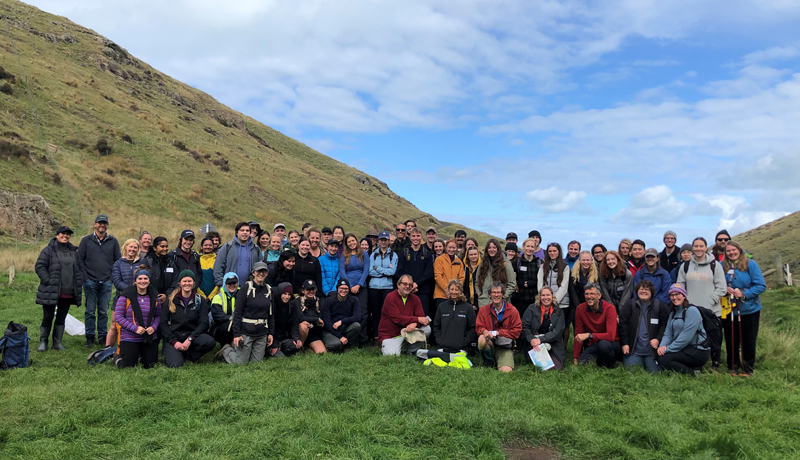Data gathering hīkoi a great learning opportunity
Third year Ecology students from University of Canterbury headed out to Te Kaio valley recently to gather data on the vegetation and birdlife on the whenua.
Te Kaio valley is the site of great historical significance to Wairewa Rūnanga, mana whenua for the land surrounding Little River. Wairewa and Orion recently signed a partnership agreement that will see the area recloaked in native forest, with the aspiration to restore the land to its original state.
Matiu Prebble from Wairewa Rūnanga says the excursion presented an opportunity to expose students to co-designed environmental initiatives that draw on iwi aspirations to restore the bush to a state last seen in the early 1800s.
“Before we start the recloaking of the whenua, we want to have some baseline data about the bird and plant biodiversity at Te Kaio. It was fantastic to be able to draw on the enthusiasm of the students, while also providing an opportunity for them to learn about this significant project.
“We are hoping that over the years to come they will contribute to the project, not only by providing observation data of manu, but also by helping to design tools that can be used by the Wairewa whānau to help build our understanding of the changing biodiversity in our takiwā.”
Under the watchful eye of lecturers and ecology experts, the rōpū of around 60 students split into eight groups taking between 5-8 samples. They started at one point at the bottom of Te Kaio valley and did five-minute bird counts approximately every hundred metres up the valley.
“This is a great opportunity for our students to put into practice some of the biodiversity monitoring techniques we learn in the classroom, which is especially meaningful to have the opportunity to develop alongside members of Wairewa Rūnanga,” says Sara Kross, Senior Lecturer at University of Canterbury.
Working alongside Wairewa, Orion assisted with the mapping and showed the students where the recloaking will take place. Wairewa shared the kōrero behind the area and the students responded with a waiata tautoko.
Orion Group’s Forest and Biodiversity Lead Clayton Wallwork says “We’re so excited to get underway with the planting, but we also want to make sure we’re gathering good data before we dive in, so we can see the impact we’re making as we go. As we repeat the data collection over the years, we should get some great insights into the effectiveness of the pest control and replanting mahi.”

